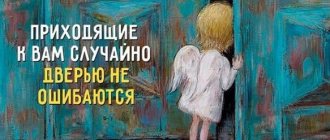Quotes from Alexander Ostrovsky
Prepared by: Dmitry Sirotkin
I present to you a selection of quotes from playwright Alexander Ostrovsky (1823 - 1886).
He wrote convincingly about the hopelessness of Russian life.
Quotes are arranged by topic: human manifestations, life, man, women, marriage, theater, love, honesty, stupidity, life ethics, tyranny, money, Russia, sin, bribes, poverty, education, jealousy, theft, crying.
About human manifestations
Some things are difficult to admit even to yourself; There are feelings that are impossible to reveal, just as it is impossible to perform naked. This nakedness may be beautiful, but it is impossible.
If you laugh at such a person or show him the contempt he deserves, he considers himself entitled to take revenge. For him, the funny is worse than the dirtiest vice.
Even the meekest person can be driven to rage. Not all criminals are villains, and a humble person will decide to commit a crime when he has no other choice.
I have a good heart and a clear conscience, and that’s why I’m getting fat.
There is no worse shame than this, when you have to be ashamed of others.
I have too much imagination and, it seems, to the detriment of reason.
I can’t remain indifferent: I have to either cry or laugh.
What a mother doesn’t see with her eyes, she has a prophetic heart; she can feel with her heart.
Courage is cultivated day after day through persistent resistance to difficulties.
About life
This is life; truly it is said: vanity of vanities and all vanity. The devil knows, you won’t even be able to figure out what you want.
The main tragedy in life is the cessation of struggle.
Learn to live even when life becomes unbearable. Make it useful.
- But there is a difference between good and evil? - They say there is some small one; it's none of our business.
But smart people notice that our time is getting shorter. It used to be that summer and winter drag on and on, you can’t wait for it to end; and now you won’t even see them fly by.
The days and hours still seem to remain the same, but time, for our sins, is becoming shorter and shorter.
You can't live in the world without cunning.
By the way, quotes about life
About a human
Alien soul of darkness.
Why don't people fly! I say, why don’t people fly like birds? Sometimes I feel like I'm a bird. When you stand on a mountain, you feel the urge to fly. That's how she would run up, raise her hands and fly.
Do people really live around us? Wolves and sheep. Wolves eat sheep, and sheep humbly allow themselves to be eaten.
There are only two kinds, there is nowhere to go: either a patriot of his fatherland, or a scoundrel of his life.
As long as you don’t see other people, your own people seem good; but when you compare, you don’t even want to look at your own.
Cruel morals, sir, in our city, cruel! In philistinism, sir, you will see nothing but rudeness and naked poverty. And we, sir, will never escape this crust! Because honest work will never earn us more than our daily bread.
By the way, quotes about a person
About women
Women like to think that they are free and can dispose of themselves as they wish. But in reality, they never have control over themselves, but clever people have control over them.
A woman's heart is soft. It is soft, but there is nothing in the world that is more evil than a woman if you offend her sensitively. It's getting scary. A woman will take terrible revenge, she can come up with such nasty things that a man would never even think of.
If you talk to women, if you don’t sin, you will sin.
Our girls are raised very poorly. You young people imagine us as angels, but believe me, Vasily Nikolaich, we are worse than men. We are more selfish, more partial. What to do! I must admit: we have much less sense of honor and strict justice.
What else is bad about us is a lack of delicacy.
By the way, quotes about women
About marriage
Why love them for nothing, their husbands? This is quite strange!
This is life! We live in the same city, almost nearby, and you see each other once a week, and then in church or on the road, that’s all! Here, whether she got married, or whether she was buried, it doesn’t matter.
Decent people do not force their wives to work, for this they have servants, and the wife only... to dress her in the best possible way, to admire her, to take her out to people, to give all the pleasures, to fulfill her every whim, like a law... to idolize her.
Whatever you say, single life is very pleasant. Now, for example, if I were married, my wife would interfere with my sleep. “Don’t sleep, darling, it’s not good, you’re not healthy, it’s making you fat.” And she doesn’t even want to know how pleasant it is for her “darling” to fall asleep when sleep sets in and her eyes close... And how nice it is to wake up single! As soon as you open your eyes, the first thought is: that you are your own master, that you are free.
By the way, quotes about weddings and marriage
About the theater
The public goes to the theater to see good performances of good plays, and not the play itself: the play can also be read.
Comedians? No, we are artists, noble artists, and you are the comedians. If we love, we love; if we don’t love, we quarrel or fight; If we help, it’s with our last penny. And you? All your life you talk about the good of society, about love for humanity. What did you do? Who did you feed? Who was consoled? You amuse only yourself, you amuse yourself. You are comedians, jesters, not us.
The time of enlightened patrons, the time of philanthropists has passed; now the triumph of the bourgeoisie, now art is worth its weight in gold, in the full sense a golden age is coming. But, no matter what, sometimes they’ll give you blackening to drink, and they’ll give you a ride in a barrel from the mountain, for your own pleasure - which Medicis you’ll attack.
About love
I was looking for love and didn't find it. They looked at me and look at me as if I was funny. No one ever tried to look into my soul, I didn’t see sympathy from anyone, I didn’t hear a warm, heartfelt word. But it’s cold to live like this.
And how uneducated people fall in love: with all their souls, that is, with all their primitive savagery!
Pride is an eternal hindrance in human love. How dearly this pride sometimes costs people. Sleepless nights, gloomy thoughts, and, finally, the last, memorable meeting for a lifetime, when eyes, hands, everything says: “Yes!”, but lips, stubbornly twisted with pride, repeat: “No!” And how many times will a person later regret this word, looking at the yellowed portrait with a farewell inscription on the back.
By the way, quotes about love
About Honesty
If you're honest, don't hang out with the dishonest, don't rub yourself under the soot - you'll get dirty yourself.
I want to retain my dear right to look everyone straight in the eye, without shame, without secret remorse, to read and watch satires and comedies about bribe-takers and to laugh from the bottom of my heart, with open laughter.
Yes, everyone tells me that I’m intolerant, that I’m losing a lot from this. Is intolerance a disadvantage? Is it better to look indifferently at the Yusovs, Belogubovs and all the abominations that are constantly happening around you? Indifference is not far from vice. Anyone who is not disgusted by vice will gradually get involved.
I have no secrets of my own. And if it’s someone else’s, then why should I take care of it?
About stupidity
You shouldn't laugh at stupid people, you should be able to take advantage of their weaknesses. “Simplicity is enough for every wise man”
Wealth is evil for fools!
If only there was more land, and the landowner would understand his own interests; otherwise you can live without your mind, sir!
Keep quiet if you don’t know anything better.
About life ethics
This was not started by us, and it will not end by us.
I have a rule: don’t forgive anyone anything; otherwise they will forget fear, they will begin to forget.
If you take everything to heart, you will soon end up with consumption.
No matter how much you wash, you will not be whiter than water. The bear doesn’t even wash himself, but he lives healthy.
About tyranny
What does my left leg want?
Amaze the world with villainy.
Who, Tit Titych, will offend you? You yourself will offend everyone.
One in four carriages.
About money
Crazy money.
There wasn’t a penny, but suddenly it was altyn!
After all, I already know what I have to give, but I can’t do everything with goodness. You are my friend, and I have to give it to you, but if you come and ask me, I will scold you. I will give, give, and curse. Therefore, as soon as you mention money to me, my insides will ignite.
By the way, quotes about money
About Russia
We have no public opinion, my friend, and cannot have one.
Don't be afraid of the court, but be afraid of the judge.
If you now count all the duties and delinquencies, salaries and expenses, taxes and shortfalls, celebrations and celebrations, then you can feel sorry for humanity. One ox cannot be skinned seven times.
About sin
It is impossible, mother, without sin: we live in the world.
And the first man did not escape sin, and neither will the last one. Sin is sweet, but man is vile.
We are sinful people; We even go to church to see people and show ourselves off.
About bribes
I will wait for the time when the bribe-taker fears a public court more than a criminal one.
We, they say, do not want to take bribes, we want to live on one salary. There will be no life after this! Who should we give our daughters to? After all, this way, what good, the human race will end. Bribes! What is the word bribe? They themselves invented it to offend good people. Not bribes, but gratitude! And it’s a sin to refuse gratitude.
About poverty
What poverty! Everyone knows how to live in poverty; no, you know how to spend your money effectively; it takes a lot of brains.
Why is it that no one gives anything to the rich, but only to the poor? It's as if the poor don't have any sense. We poor people only have no money, but our minds are the same as yours. What kind of light is this today! Everyone tries to give instructions, but no one gives money.
About education
What is the use of learning when a person has no fear... no trepidation before his superiors?
Corruption of morals at two ends: in ignorance and in excess of education; good morals in the middle.
By the way, quotes about education
About jealousy
Jealous people are jealous for no reason.
Aren't you jealous? No, stop this nonsense.
About theft
Here's public opinion: if you're not caught, you're not a thief.
It’s good for someone who has a lot of loot, he can very well be a serviceable citizen.
About crying
Is there anything more bitter in the world than orphan tears?
And the crocodiles cry, but still swallow a whole calf.
About miscellaneous
When they turn to a doctor, they do not demand compassion from him, but knowledge of his field and useful advice.
Happiness will not follow you if you run from it.
There are many wonderful things in the world, but we don’t want to notice them.
Song is the soul of the people. If you ruin a song, you kill your soul.
Talent in itself is expensive, but in combination with other qualities: with intelligence, with kindness of heart, with spiritual purity, it already seems to us such a phenomenon that we must bow to.
- Borrow a cigar! - Which ones do you want? - Yes, I always smoke one kind. - Which ones? - Strangers.
As you can see, Ostrovsky’s quotes touch on a wide range of topics . Some of these quotes are aphoristic, but in my opinion it’s not worth looking for any new, original thoughts in them.
Quotes about Ostrovsky
- N. Dobrolyubov: Ostrovsky has a deep understanding of Russian life.
- I. Goncharov: You donated a whole library of works of art to literature and created your own special world for the stage. You alone completed the building, the foundation of which was laid by Fonvizin, Griboyedov, Gogol. But only after you, we Russians can proudly say: “We have our own Russian, national theater.” It, in fairness, should be called: “Ostrovsky Theater”.
- M. Saltykov-Shchedrin: Ostrovsky is such a lucky man. Only laurels and roses wrap around his brow, and since his brother became a minister, he himself has become more handsome. I stopped drinking kvass because it produces wind, and the courtiers go to see their brother... (by the way, quotes from Mikhail Saltykov-Shchedrin)
- L. Tolstoy: “The Thunderstorm” by Ostrovsky is a deplorable work, but it will be a success. (by the way, quotes from Leo Tolstoy)
- Yu. Aikhenvald: This is gone and is going away, even the notorious tyranny. And Ostrovsky leaves with him. It loses its meaning. His plays are doomed - very soon they will no longer be staged.
- A. Lunacharsky: Father of Russian theater.
- K. Stanislavsky: “The Snow Maiden” is a fairy tale, a dream, a national legend, written and told in Ostrovsky’s magnificent sonorous verses. One might think that this playwright, the so-called realist and everyday writer, never wrote anything except wonderful poetry, and was not interested in anything else except pure poetry and romance. (by the way, quotes from Konstantin Stanislavsky)
You can then move on to Ostrovsky’s phraseological units and other collections of quotes:
- Shakespeare quotes
- Pushkin quotes
- Gogol quotes
- quotes from Nekrasov
- Chekhov quotes
- Bulgakov quotes
I would be grateful if you share the link to the article on social networks with your friends. Use the network buttons below .
Comments are also highly welcome!
History of creation
Alexander Ostrovsky spent his childhood and youth in Zamoskvorechye. Here he studied well the life and customs of different classes of Moscow, especially the merchants and philistines. After studying at the Faculty of Law of Moscow University, he entered the service of the judicial chamber, which provided rich life material for the future playwright. Ostrovsky began writing very early, but his first dramatic experience, the play “We Will Be Numbered as Our Own People” (1847), caused a storm of indignation among the trading class. The merchants even filed a complaint against the author with the sovereign's office. The result was not just a ban on the work, but also the establishment of police surveillance over the author.
But despite this, the work of Alexander Ostrovsky, one of the greatest Russian playwrights of the 19th century, had a great influence on the development of Russian theater. Ostrovsky was elected an honorary member of the St. Petersburg Academy of Sciences, he was one of the founders of a new theater school and began to publish in the Sovremennik magazine.
The comedy by A. N. Ostrovsky “The Forest” was written in the 70s of the 19th century, actually ten years after the abolition of serfdom. As in any similar situations, when old relationships are broken down and new ones are born, many problems arise that affect different segments of the population - the peasantry, the nobility (which is already failing in many areas), and the emerging bourgeoisie.
This play poses many problems characteristic of this period of Russian development. At the same time, many great Russian writers responded to the changes arising in society - this is Saltykov-Shchedrin with the novel “The Golovlev Gentlemen”, Leo Tolstoy in the novel “Anna Karenina”:
“In Russia everything has been turned upside down and is only getting better.”
Work on the play “Forest” took place in the literary and ideological proximity of Ostrovsky with the leaders of the journal “Otechestvennye zapiski” N. A. Nekrasov and M. E. Saltykov-Shchedrin.
As was customary in literary circles of that time, the play, even before publication, was read among intellectuals, artists, and in private homes, and was received enthusiastically. Its first reading in St. Petersburg took place with the playwright’s brother, M. N. Ostrovsky.
“I received your play and have already read it in the presence of Annenkov, Filippov and Feoktistov. Everyone is absolutely delighted. The impression it makes is so strong that you have to give it time to notice anything, and therefore at the present time, apart from unconditional praise, I can’t tell you anything about it.”
Genre, direction
The work of A.A. Ostrovsky “The Forest” is a sharp social-satirical play of a realistic direction.
However, many critics believe that “The Forest” is one of Ostrovsky’s most perfect, but at the same time, most complex works. Therefore, it is difficult to limit ourselves to any specific genre. There is also an opinion about this play that it seems like several plays are being played out simultaneously, and of different genres. One of the central lines in the play - the line of two provincial actors - Neschastlivtsev and Schastlivtsev - is reminiscent of vaudeville in a number of ways: for example, coming to the Gurmyzhskaya estate under false names. The actors at Aunt Neschastlivtsev’s estate are performing a mini-play, during which the penniless Neschastlivtsev puts on his acting costume and introduces himself as a rich gentleman, a retired military man, and his colleague, the good-for-nothing Schastlivtsev, is his lackey. In a vaudeville style, Arkashka Schastlivtsev communicates with the footman Karp, calling him, now Perch, now Carp, now Sturgeon.
The story of the elderly lady Gurmyzhskaya falling in love with the dropout high school student Bulanov is a real farce. The definition of the genre confirms the rapid transformation of a boorish, half-educated boy into an arrogant and insolent bastard.
“If only I could establish myself more firmly, look at how I behave - I’ll take the whole district into my hands. And as for your interests, Raisa, believe me.”
The genre in which the poor girl Aksyusha lives, with her dreams, feelings, for whom if you love - then to the end, if not with your beloved, then at least into the hole - this is already the genre of high romantic drama, the hero of which involuntarily becomes the great tragedian - Neschastlivtsev. And the finale of the play is a continuation of the drama, with a farewell chord. For some critics, this ending of the “comedy” is reminiscent of Chatsky’s final departure.
“Well, Arkady, we are with you. We feasted and made some noise, brother; now back to work,” And turning to Karp, “If the troika arrives, brother, you bring them back to the city; say that the gentlemen have gone on foot. Hand, comrade!
Meaning of the name
The name of the play “Forest” is not accidental. It's allegorical. As the action develops, we repeatedly encounter the word forest, the concept of forest, and the symbolism of this concept.
Gurmyzhskaya’s estate is called Penki. This is symbolic because she is selling off her forest, which is about to be cut down. The names of the wastelands are Gorelaya, Palenaya and Pylaevo. The plot of the work can be considered the business negotiations between Gurmyzhskaya and the merchant Vosmibratov about the sale of the forest. The fact that the lady is selling off the forest surrounding her estate indicates that her business is not going well. In a transaction to purchase a forest, we encounter an obvious fraud of a merchant who, having promised to pay three thousand for the forest, barely gives the owner only two. Peter wants to commit suicide in the forest, hang himself from a tree. Every now and then he looks out for the right strong branch. Vosmibratov, in a conversation with Gurmyzhskaya, approves of the sale of the forest:
“After all, with the forest, madam, believe me, there is only one sin; peasants steal - sue them. The forest is near the city, every runaway, every tramp has a refuge, and for servants too, for the female sex. Because they are interested in mushrooms and berries, but it turns out quite the opposite.”
Even the main characters of the play - the actors Neschastlivtsev and Schastlivtsev - meet at the crossroads of two forest roads. The forest is also a symbol of a gloomy, dark life, without light and hope for change. In the finale, Neschastlivtsev characterizes her with the words of the hero of Schiller’s drama “The Robbers”:
“People, people! Spawn of crocodiles! Your tears are water! Your hearts are solid damask steel! Kisses are daggers to the chest! Oh, if only I could enrage all the bloodthirsty inhabitants of the forests against this hellish generation!”
The forest is a symbol of human relationships, as well as the darkness and denseness of provincial life. As Karp says in act three, scene four:
“We live in the forest, we pray to the stump, and even then lazily.”
“Why did we come, how did we get into this forest, into this dense forest? Why did we, brother, scare away the owls and eagle owls? - asks Neschastlivtsev. “Everything is fine here, as it should be in the forest.” Old women marry high school students, young girls drown themselves from bitter life with their relatives: forest, brother.”
Themes
The play "The Forest" follows the themes outlined in the following list:
- The theme of decadence and ruin of the nobility.
The action develops around this theme, communication with the merchant, an agreement with him on the purchase and sale of forests, the merchant’s fraud; on the basis of the merchant’s visits to the estate with his son, the young girl Aksinya and the merchant’s son Peter meet. The sale of the forest, as in the play “The Cherry Orchard,” signifies the gradual ruin of the nobility and its degradation. The owner of the estate does not see the fraud, does not understand finances and simply spends the wealth accumulated over centuries for her selfish needs. - Theme of true and false love.
The relationship between Gurmyzhskaya and her high school dropout protégé Alexei Bulanov and the relationship between Aksyusha and Peter, young lovers who cannot get married due to lack of a dowry, are contrasted. In the first couple, the love is false: the noblewoman likes being flattered, but the schoolboy does it for the sake of money. And in the second case, the young people really love each other; in any case, Aksinya is even ready to commit suicide if her marriage does not take place. The author draws a line between true and false feelings, showing the insignificance of one and the greatness of the other. - The theme of generosity and greed.
The honest and noble Neschastlivtsev unwittingly finds himself drawn into the events taking place in the estate. He restores justice - he takes the money from the fraudulent merchant that he did not give to Raisa Pavlovna. Gurmyzhskaya returned this money to her nephew, since she owed him exactly that amount. Gennady was already making plans on what he would spend such a lot of money on, but having learned that this is exactly the amount Aksinya needs to marry Peter, without hesitation, he transfers the money to Aksyusha for a dowry. - The main motives in the play are the motives of truth and lies
. In the play, it is the actors who make a choice in favor of real values and debunk lies. For this they are called “Comedians”. But the truth is that ordinary people behave like they are on stage: they are hypocrites, they deceive, they act out a performance for money. The author showed that the world has turned upside down.
The bottom line: what?
This question can be briefly answered this way: this play is about the clash of interests of very different people in social status. It is about truth and lies, about hypocrisy and hypocrisy, about sincerity and purity, about high nobility and arrogant impudence. The rich widow Gurmyzhskaya, owner of the Penki estate, invites the merchant Vosmibratov and his son to sell part of her forest. The merchant's son and the landlady's distant relative Aksinya are in love with each other. The father is not against the girl, but he demands a dowry that is not available.
A young man, Alexey Bulanov, a high school student and dropout, lives in Gurmyzhskaya’s house. The mistress of the estate falls in love with a young man and is going to marry him. The hostess's nephew, Gennady Gurmyzhsky, unexpectedly arrived at the Estate with his footman Arkasha (Provincial actors - Neschastlivtsev and Schastlivtsev). Out of pride, Gennady pretends to be a rich gentleman, a retired officer. By the will of fate, he finds himself drawn into the internal affairs of the mistress of the estate and its inhabitants. Honest and noble Gennady does not tolerate lies and deception and forces the merchant to return to Gurmyzhskaya the amount not given - a thousand rubles. Raisa Pavlovna owed her nephew the same amount and gives him this money. The actors are making plans to make a good living with this money. However, it turns out that the happiness and very life of the young girl Aksinya depend on one thousand rubles. Gennady generously gives these days to the girl as a dowry, and he himself again remains the same poor man as he was before.
main idea
The meaning of the play “The Forest” is to expose social injustice in relations between different classes. The author demonstrates the collision of the world of the owner of the Gurmyzhskaya estate, her rich neighbors - landowners - Milonov and Bodaev, the merchant Vosmibratov, living in their musty world of mercantile interests, gossip, and the world of people dependent on them - Karp, Ulita, Bulanov, Peter - when each of them In order to survive and to snatch a “piece” for themselves, they are ready to humiliate themselves, be hypocritical, and be mean. Because of the vile dependence of some on others, hypocritical and dishonest relationships are formed, which create social problems and conflicts.
Opposing this order of things are two provincial actors - Gennady Neschastlivtsev and Arkady Schastlivtsev. The unfortunate person does not accept meanness, intrigue, or indifference and, to the best of his ability, restores justice. These are truth-seekers who show the main idea of the play “The Forest”: the orders that reign in this thicket need to be changed.
Problems
The issues in the play “The Forest” are briefly described below. If it needs to be added, write about it in the comments:
- The problem of social injustice
. People who inherited a fortune become misers and do not help society in any way, leaving the poor to their fate. They bypass even their relatives and spend money only on their own selfish needs, although they have not earned a penny from their labor. - The problem of financial dependence and the women's issue
. We learn the story of a young girl Aksinya, who is wondering where to get money to give the merchant Vosmibratov a thousand rubles as a dowry. Life at home with a relative is unbearable for her, and they won’t marry her without money. What remains for the poor girl? Only in a loop, because there is no way out. She cannot earn money by honest work; in a patriarchal society she is helpless and equated to a thing. - The problem of art
. Gifted artists go around the world, because cruel morals and exploitation of talent reign everywhere in their field. Actors receive pennies for their performances, and everywhere they try to deceive them. However, they cannot organize their own business, because they have nowhere to get the initial investment. The state does not protect their rights in any way, but regularly collects taxes. - The problem of the immorality of the merchants
. Entrepreneurs sought to make money even for the happiness of their own children, and with strangers they did not disdain the most illegal methods of doing business. They cheated, and again no one could protect people from their tyranny. - The problem of ignorance and hypocrisy of the nobility
. People from this class received wealth and power initially without doing anything for it, so many of them did not develop spiritually and intellectually. Because of this, they easily succumbed to deception, masking their stupidity with pompous phrases, which in practice turned out to be lies.
Composition and Conflict
The composition of Ostrovsky's play "The Forest" is complex; there is no compositional unity here, as in his other works, for example, in "The Thunderstorm" or "Dowry". Vaudeville artist P. Karatygin called this play “a new thing, sewn from colorful scraps”). The play contains three fairly independent storylines: the stories of Gurmyzhskaya and Bulanov, Aksyusha and Peter, and, finally, the line of provincial actors - Neschastlivtsev and Schastlivtsev.
The plot and conflict in a dramatic work usually relate to a specific goal facing the characters and their attempts to achieve it or fail. Here, the heroes of each of the listed storylines have their own specific goals: Gurmyzhskaya dreams of marrying a high school dropout, the cute and flattering Alexei Bulanov, the lover Aksinya dreams of receiving a dowry and marrying her chosen one - Pyotr Vosmibratov, the traveling actors Neschastlivtsev and Schastlivtsev dream of finding dramatic actress, since in this case they will have more chances to create their own troupe. Yes, in the play all three storylines are intertwined, the characters are connected to each other through family, financial or business relationships. As we are convinced when reading the play, it is unusually socially capacious, since it allows us to imagine in miniature the society of that time.
What does it teach?
The moral of the play "The Forest" is to condemn the vices of society. The appearance of Gennady Neschastlivtsev and Arkady Schastlivtsev, like a spotlight, highlighted all the negative aspects of their existence: hypocrisy, greed, stinginess, cruelty, deceit. The play teaches that nobility and commercialism are incompatible concepts. The author shows the moral victory of the poor actor Neschastlivtsev over the society around him and makes him think that nobility is not only understanding and pompous words, it is also an active action in order to make someone in this life feel better.









